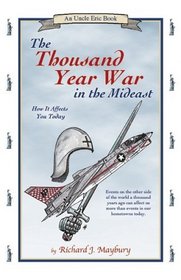I read this years ago. At the time I was very impressed with it and thought that poor Islam was the most maligned and misunderstood religion in the world, and that the Islamic world had been treated very badly by the West, in particular Europe and America.
Now, having learned a bit more about the realities behind the PC image, I have to wonder why the author gives Muslims a free pass for all the bad things they did (and do) -- as though being Muslim and having suffered under the Crusades made them so special that 9/11 was the only reasonable course of action they could be expected to do. Of course it was all right to ram planes full of innocents into buildings full of innocents (including daycares full of little children!), because, you see, the West had done such terrible things in the fourteenth century. After all, Spain was so enchanted with the rule of the Moors that it spent centuries kicking them out.
Oh. Right. The Moors invaded Spain, just as Muslim forces conquered much of North Africa and the decaying remains of the Byzantine empire, wiping out Christianity on two continents. They were brutal, unwanted invaders, not wonderful visitors bearing enlightenment, and the Crusades were at least in part an effort at self-defense by what remained of the Christian world. How ungrateful of the Spanish to resent being beaten and raped into submission.
In retrospect I also find it annoying that the author paints the Muslim penchant for holding grudges in such a holy light. "They think nothing of spending decades plotting revenge."
And this is a good thing? What a waste of time and talent! Christianity teaches that God is the only one allowed to take revenge and that we are to forgive our enemies. This allows us to move on from the painful past without dragging grudge-carcasses behind us. Yes, there will be scars and bad memories, but they are not the end. In contrast, the author apparently thinks it is okay for Muslims to do bad things because "bad things have been done to them," although some of those "bad things" include conquered peoples reasserting themselves, target countries successfully repelling Muslim navies, and foreigners beating them at their own game -- conquest.
In short, if you read this, you should also read a couple of good history books and then spend some time thinking about the disparities between them and this title. For example, read about the Siege of Malta in 1565, the Battle of Lepanto, and the battle of September 11, 1683. (Does that date sound familiar?) Read Walid Shoebat's account of why he left the cause of Islamic terrorism. This book heavily favors the Muslim viewpoint without honestly explaining what it is.
I recycled my once-read copy because I did not want to be part of passing on such a flawed ideology.
Now, having learned a bit more about the realities behind the PC image, I have to wonder why the author gives Muslims a free pass for all the bad things they did (and do) -- as though being Muslim and having suffered under the Crusades made them so special that 9/11 was the only reasonable course of action they could be expected to do. Of course it was all right to ram planes full of innocents into buildings full of innocents (including daycares full of little children!), because, you see, the West had done such terrible things in the fourteenth century. After all, Spain was so enchanted with the rule of the Moors that it spent centuries kicking them out.
Oh. Right. The Moors invaded Spain, just as Muslim forces conquered much of North Africa and the decaying remains of the Byzantine empire, wiping out Christianity on two continents. They were brutal, unwanted invaders, not wonderful visitors bearing enlightenment, and the Crusades were at least in part an effort at self-defense by what remained of the Christian world. How ungrateful of the Spanish to resent being beaten and raped into submission.
In retrospect I also find it annoying that the author paints the Muslim penchant for holding grudges in such a holy light. "They think nothing of spending decades plotting revenge."
And this is a good thing? What a waste of time and talent! Christianity teaches that God is the only one allowed to take revenge and that we are to forgive our enemies. This allows us to move on from the painful past without dragging grudge-carcasses behind us. Yes, there will be scars and bad memories, but they are not the end. In contrast, the author apparently thinks it is okay for Muslims to do bad things because "bad things have been done to them," although some of those "bad things" include conquered peoples reasserting themselves, target countries successfully repelling Muslim navies, and foreigners beating them at their own game -- conquest.
In short, if you read this, you should also read a couple of good history books and then spend some time thinking about the disparities between them and this title. For example, read about the Siege of Malta in 1565, the Battle of Lepanto, and the battle of September 11, 1683. (Does that date sound familiar?) Read Walid Shoebat's account of why he left the cause of Islamic terrorism. This book heavily favors the Muslim viewpoint without honestly explaining what it is.
I recycled my once-read copy because I did not want to be part of passing on such a flawed ideology.




